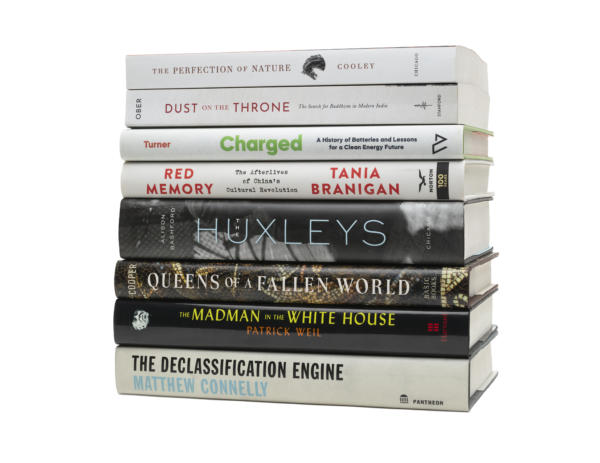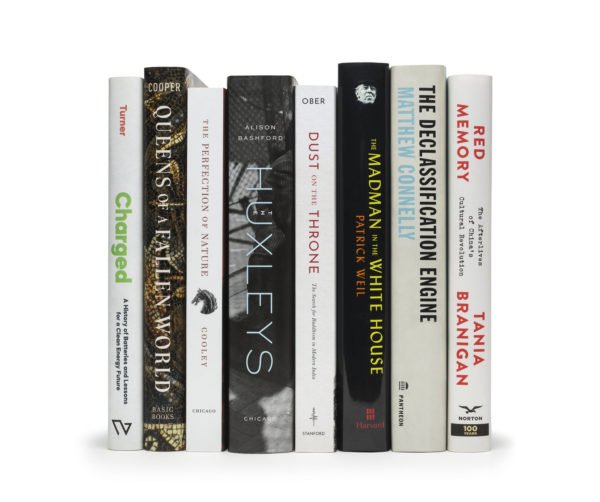September 28th 2023 in News
Energy, data and religion - Cundill History Prize jurors bring history to the present with 2023 shortlist

From clean energy’s “battery problem” to revelations on China’s Cultural Revolution, from US state secrets to new takes on religion and mental health – the shortlist for the 2023 Cundill History Prize celebrates books that create “dialogues between dilemmas of yesterday and today”.
The multi-disciplinary historian Philippa Levine, 2023 Chair of the Jury, announced the shortlist at an exclusive in-person event at Scandinavia House in New York City, organised by McGill University, administrators of the US$75,000 prize. She was joined by fellow juror Eve Troutt Powell and Professor of History at New York University Jennifer L. Morgan, a previous juror for the prize, for a conversation on the craft and consequence of historical writing, and the experience of being a juror for a major book prize.
Philippa Levine said: “This shortlist includes heart-breaking tales from China’s Cultural Revolution, biography, environmental concerns, religion, data management, and much more. It ranges in time from the ancient Mediterranean to the really recent past, and examines animals as well as humans. Every one of these authors advances original conceptions and tells a gripping story. We could not be more thrilled with the eight titles that have made it to this year’s shortlist.”
University presses from the US dominate this year’s shortlist, with titles from the University of Washington Press, Stanford University Press, and Harvard University Press. The University of Chicago Press is represented with two titles. Knopf Doubleday’s Pantheon Books is joined by independent publishers Faber & Faber and Basic Books.
Nature and evolution are prevalent topics in this year’s shortlist with titles that include The Huxleys by Alison Bashford taking us through two hundred years of modern science, evolution and culture through one family’s history. The Perfection of Nature by Mackenzie Cooley guides us on a journey through the Renaissance and Spanish Empire to explore how the idea of race and theories of inheritance developed through animal breeding and the desire to control the natural world. Climate consciousness also came to the fore with the selection of Charged by James Morton Turner which seeks to explore “the battery problem”, drawing on the past for crucial lessons that will help us build a fair clean energy future.
State secrets, lost biographies, and national amnesia are subjects that are also highlighted. Matthew Connelly’s The Declassification Engine untangles the secrecy-industrial complex through a crucial examination of US state secrets and exposes how overclassification makes it impossible to protect truly vital information. The Madman in the White House by Patrick Weil paints an illuminating picture of the troubled Woodrow Wilson through a resurrected psychobiography crafted by Sigmund Freud and William C. Bullitt, and in Red Memory Tania Branigan provides an eye-opening exploration of the Cultural Revolution by dissecting cultural amnesia in China and studying how it shapes the nation today.
Histories that mark the considerable impact of marginalised identities in shaping two of the world’s significant religions conclude the list. Queens of a Fallen World by Kate Cooper unravels the lives of the women who shaped St Augustine and how they would change Christianity for centuries to come, and Douglas Ober uncovers the integral yet unacknowledged role that anti-caste activists played in the making of modern global Buddhism and how the religion shaped modern Indian history in Dust on the Throne.

Juror Adam Gopnik said: The shortlist we’ve assembled for the Cundill History Prize pleases me, as a non- academic with transiently scholarly tastes, for its range, and its insistence on the registry of particular human experience within the broader currents of social history. Whether looking at the surprising interchange of mysticism and materialism in the Huxley family, or considering the hidden lives of the women who helped shape the theology of Augustine – whether finding the most bizarre and illuminating connection between Sigmund Freud and Woodrow Wilson, or tracking the inventors who made the mundane but essential invention of the battery – these books are a contribution to an ideal of history as a thing perpetually open to human intervention, and therefore inviting contemporary readers to intervene in their own.
Juror Sol Serrano said: “As a reader of history, I have never travelled as far, or as intensely, as I did whilst reading these books. From the challenge of storing electricity in batteries to the tensions between religion and nationalism; from the fast politics of the 20th century to the long search for Buddhism in India, all these books have in common a desire to establish human dialogues between the author and the reader; between the dilemmas of yesterday and today. These are books that teach us; awaken our curiosity and, above all, make us think about the lives of others. This is history writing today.”
Juror Col Thrush said: “It was no easy task whittling our list down to a shortlist of eight – we have been reading some of the best historical writing across a wide range of fields. But the eight we have chosen reflect the Cundill History Prize’s criteria of craft, communication, and consequence, and represent a rich diversity of subjects and perspectives – and the vitality and relevance of history as a discipline more generally. As the jury moves toward our final decisions, we have some very difficult – but exceptionally satisfying – work to do!”
Juror Eve Troutt Powell said: “These eight titles reach a depth of passion, feeling and narrative flow that expresses the highest level of the craft and art of historical research and writing. Reading them has brought me to an intellectual garden that I haven’t experienced since graduate school. This shortlist is deeply concerned with abuses of political power, and therefore speaks directly to the anxiety of our time.”
Lisa Shapiro, Dean of Arts at McGill University, said: “This stellar shortlist demonstrates just what the best history writing can do for us in the present. We are delighted to announce it here, in New York City, and to have the Cundill History Prize visit the US for the first time since 2019. We are already looking forward to a packed calendar of events in November at the Cundill History Prize Festival and winner announcement in Montreal. I don’t envy the jurors and the tough decisions they have to make.”
Awarding US$75,000 to the winner and US$10,000 to the two runners-up, the Cundill History Prize is the largest purse for a book of non-fiction in English. It is open to books from anywhere in the world, regardless of the author’s nationality, as well as works translated into English.
The 2023 finalists will be announced in mid-October, and the winner will be named as part of the Cundill History Prize Festival on November 8. For the latest news on these and the wider events programme, sign up to the newsletter and follow the Cundill History Prize on Twitter, Facebook and Instagram.
The 2023 winner will join an exceptional alumni list of world-class historians: Tiya Miles (2022), Marjoleine Kars (2021), Camilla Townsend (2020), Julia Lovell (2019), Maya Jasanoff (2018), Daniel Beer (2017), Thomas W. Laqueur (2016), Susan Pedersen (2015), Gary Bass (2014), Anne Applebaum (2013), Stephen Platt (2012), Sergio Luzzatto (2011), Diarmaid MacCulloch (2010), Lisa Jardine (2009), Stuart B. Schwartz (2008).
Share this
Archive
2025: February (1) March (1) July (1) September (2) October (1)2024: February (1) March (1) May (1) August (1) September (2) October (2)
2023: February (1) June (1) September (1) October (1) November (1)
2022: March (1) June (1) September (2) October (1) December (1)
2021: February (1) April (1) September (2) October (1) December (1)
2020: February (1) May (1) September (2) October (1) December (1)
2019: March (1) June (1) September (2) October (1) November (2)
2018: April (1) June (1) September (2) October (1) November (1)
2017: May (1) July (1) September (1) October (2) November (1)
Recent Posts
Lyndal Roper wins 2025 Cundill History Prize for Summer of Fire and Blood
Freedom, Independence and Choice: Finalists for the 2025 Cundill History Prize Announced
The 2025 Cundill History Prize Shortlist
The 2025 Cundill History Prize Longlist
2025 Cundill History Prize Jury announced as record number of submissions received
Kathleen DuVal wins 2024 Cundill History Prize for Native Nations